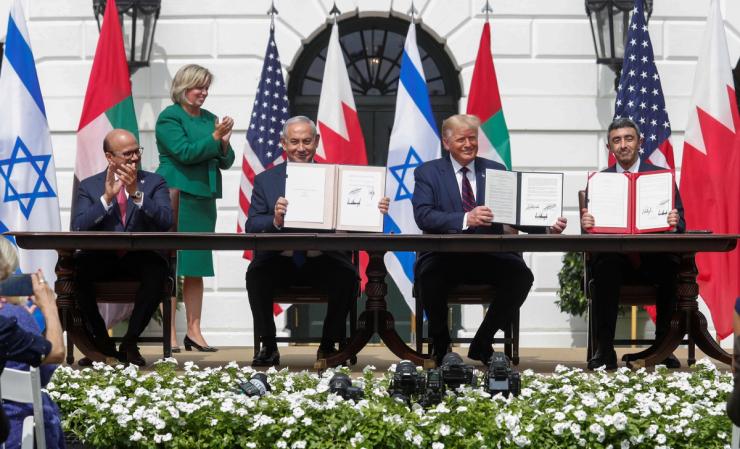The Scene
Last year’s anniversary of the Abraham Accords passed in silence. This year, the mood is openly frigid.
Israel is planning a new offensive to fully occupy Gaza in its effort to end Hamas’ control of the enclave and free its remaining hostages. It is also signaling plans to annex 82% of the West Bank, and is framing a global movement to recognize a Palestinian state — which has been key to Israel’s recognition among Arab and Muslim countries — as a reward for Hamas’ Oct. 7 massacre.
As Israel continues to attack multiple countries, it’s facing a growing backlash. The UAE accused Israel of betraying the spirit of the accords and rallied around Qatar after Israel bombed a Hamas compound in Doha last week. Arab and Muslim leaders gathered in Qatar on Monday alongside Iran’s president, who only three months ago launched ballistic missiles at Qatar, to coordinate a response to Israeli aggression.
The Abraham Accords, which were supposed to be the centerpiece of US President Donald Trump’s foreign policy, is now in damage control. Few expect countries Bahrain and the UAE to abandon diplomatic ties, but the momentum to expand relations has stalled.
“The Abraham Accords are a watershed, and we should only work to foster and strengthen them,” Israeli President Isaac Herzog told a small delegation of reporters visiting the country from the Gulf this month. “There should be no steps taken that should hurt these steps in any way. My dream is to see Israeli kids meeting kids in all your countries, and vice versa.”
Trump himself has shifted tone. In May, he said he expects to expand the accords, but set no timetable for Saudi Arabia or others. On the anniversary, his message was cautious: “Israel and everybody else, we have to be careful. When we attack people, we have to be careful.”
In this article:
Know More
Trade ties forged under the accords remain intact, and are growing in some sectors. Flights between Israel and the UAE are full, though Emirati visitors — indeed, foreign tourists overall — to Jerusalem and Tel Aviv are scarce. Abu Dhabi continues to spend political capital to preserve relations even as public hostility deepens, according to an Abu Dhabi-based analyst who declined to be named (itself highlighting how strained relations are now).
Images of Gaza, carried nonstop on Emirati and Saudi news channels — not just Qatar’s Al Jazeera or Iranian media — are stoking widespread anger, the analyst said. This is amplifying a feeling of anger and humiliation among Gulf Arabs, they said, which at some point forces leaders in the region — who mostly abhor Hamas, Hezbollah, and the Muslim Brotherhood — to align with their population.
Mohammed’s view
On a visit to Israel this month, the human gains of the accords were clear. Planes were packed, and Israeli Arabs were clearly benefiting from access to the UAE’s market. A dentist from Umm al-Fahm, near Haifa, is importing veneers from Dubai made by Syrian technicians to implant in Jewish patients — a surreal supply chain where Israeli smiles will be crafted by the Syrian diaspora.
Jewish investors, too, are active in the UAE, but the community keeps a lower profile amid security concerns. Trade data confirms growth.
But business was never the top priority of the accords. Israel and the Gulf are wealthy, and don’t need to make concessions of this scale in order to make more money. The accords’ real aim was security, recognition, and further integration, and this is what is fraying.
Rebuilding trust will require major concessions, mostly on Israel’s side, and that outcome is unrealistic given the country;s security concerns and the fact that Hamas continues to hold hostages. Barring a major breakthrough — which only Trump can deliver — the Abraham Accords next year will again be marked, and not celebrated.
Room for Disagreement
Doubling down on the Abraham Accords is the surest path to defeating Hamas, Ted Deutch, former US congressman and CEO of the American Jewish Committee, writes in The Times of Israel. Rather than seeing relations fray, he said the region needs “more diplomacy, more partnerships, more normalization” in a post-Oct. 7 Middle East.
Notable
- Israel’s strikes in Doha did away with the idea of a US security guarantee in the region, Carnegie Endowment for International Peace scholars write in an examination of the mission’s fallout.

